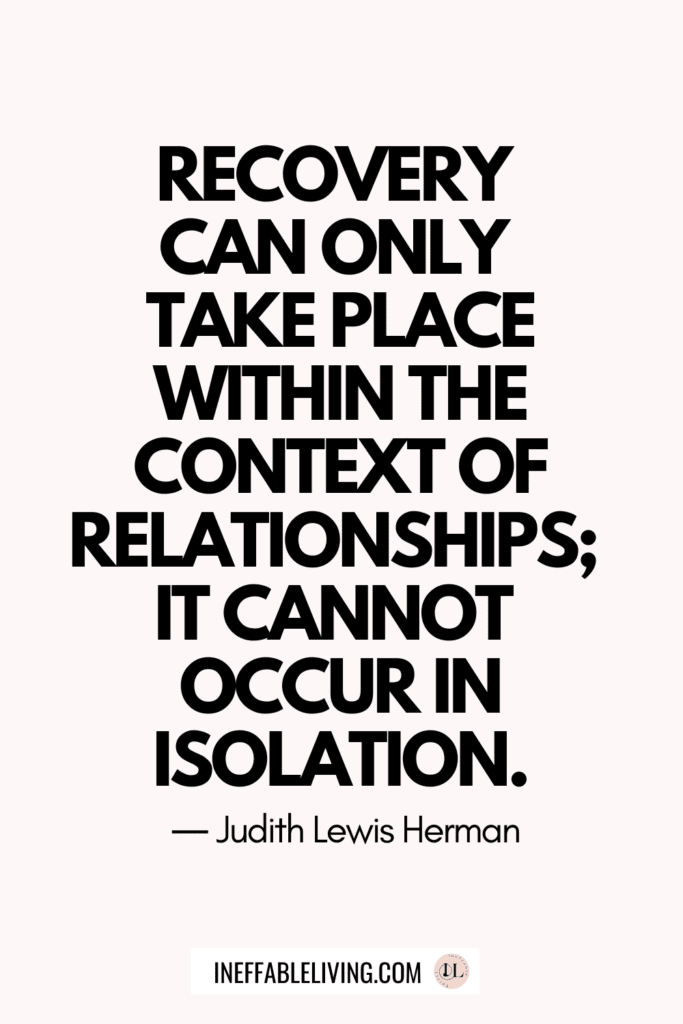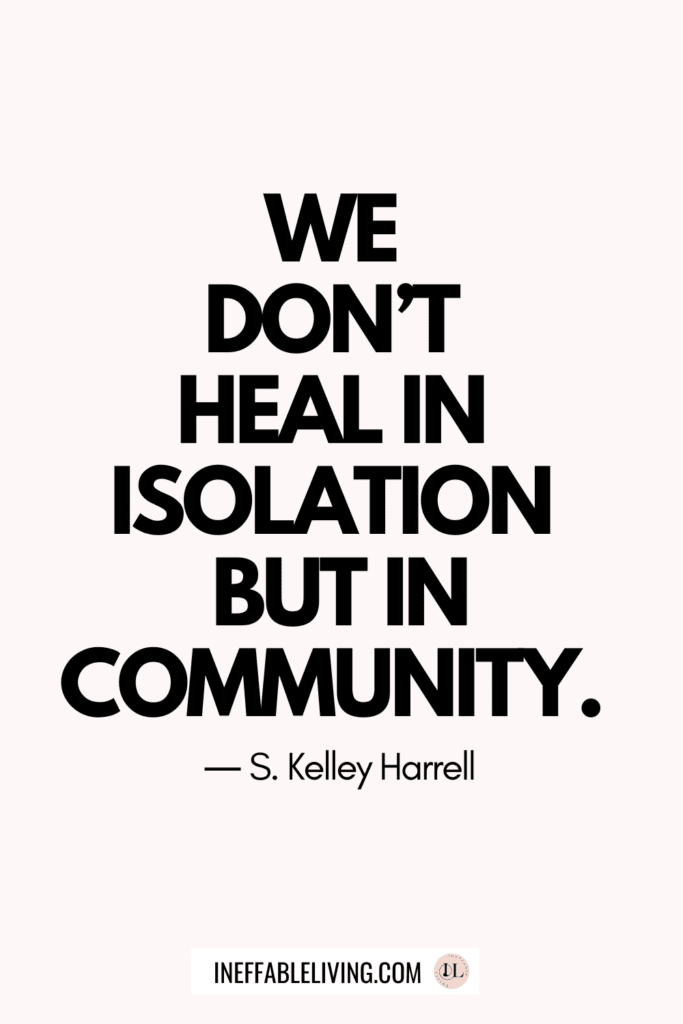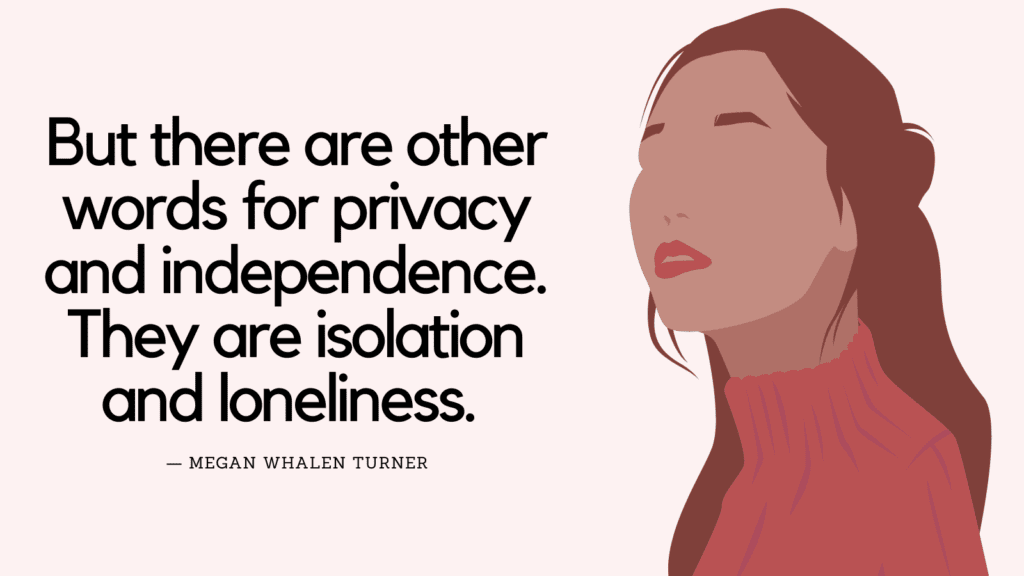This post contains some of the best quotes for isolation.
Quotes For Isolation
1. “Why do people have to be this lonely? What’s the point of it all? Millions of people in this world, all of them yearning, looking to others to satisfy them, yet isolating themselves. Why? Was the earth put here just to nourish human loneliness?” ― Haruki Murakami
2. “We’re all islands shouting lies to each other across seas of misunderstanding.” ― Rudyard Kipling
3. “We don’t heal in isolation but in community.” ― S. Kelley Harrell
4. “Too much isolation can be a danger to you and your health. It is a hazard to the common people, as well as a benefit to those who know how to use their free time.” ― Mwanandeke Kindembo
Related: Best 9 Tips On How To Stop Avoidance Coping (+FREE Worksheets PDF)
5. “To truly strip a man of everything, one must take away his money, community, and the core of his beliefs until he is bathed in the agony of isolation.” ― Leinad Eibam
6. “There was cruelty in silence, and isolation made it worse.” ― Jordan Dane
7. “There is a difference between solitude and isolation. One is connected and one isn’t. Solitude replenishes, isolation diminishes.” – Henry Cloud
8. “The worst kind of loneliness in the world is isolation that comes from being misunderstood. It can make people lose their grasp on reality.” ― Shyza Chaudhry
9. “Isolation and loneliness are central causes of depression and despair.” ― Bell Hooks
10. “In constant physical or emotional isolation, nothing seems real, not even ourselves. It’s only in the reflective eyes of others that assures us we exist at all.” ― Jason Versey
11. “If you meet a loner, no matter what they tell you, it’s not because they enjoy solitude. It’s because they have tried to blend into the world before, and people continue to disappoint them.” ― Jodi Picoult
Related: Top 10 Social Withdrawal Signs — & How To Social Isolation? (Hikikomori Syndrome)
12. “I am a stranger in this world, and there is a severe solitude and painful lonesomeness in my exile.” ― Kahlil Gibran

13. “But there are other words for privacy and independence. They are isolation and loneliness.” ― Megan Whalen Turner
14. “Anything that inspires addiction or obsession – substances, entertainment, beauty, secrecy – is dangerous in that it can lead to isolation, self-absorption, and disconnection, to paralyzed stasis: an immobility that gathers like a force.” ― Greg Carlisle
15. “A person is a person through other persons; you can’t be human in isolation; you are human only in relationships.” – Desmond Tutu
16. “A hermit is simply a person to whom civilization has failed to adjust itself.” ― Will Cuppy
17. “Isolation and the potential loss of loving connection is coded by the human brain into a primal panic response.”- Sue Johnson
18. “Being alone never felt right. Sometimes it felt good, but it never felt right.” – Charles Bukowski
19. “The most terrible poverty is loneliness and the feeling of being unloved.” — Mother Teresa
20. “Recovery can only take place within the context of relationships; it cannot occur in isolation.” ― Judith Lewis Herman
21. “I think isolation is one of the greatest problems, an ever-growing obstacle to political solidarity.” ― Elfriede Jelinek
Related: 30 Day Social Anxiety Challenge That Will Help You Feel More Confident

22. “Negative emotions are not the real villain; rather, it is when the person chooses avoidance and isolation to cope with the negative emotions that bigger problems are likely to arise. Essentially, the person is taking a step back from the world around them, including both the stressful things (difficulty with paying bills after job loss) and potentially healthy things (support from family members after losing a loved one) in their life. The more someone pulls away, the worse they feel; and, the worse they feel, the more they want to pull away. This is when avoidance takes over.” – Daniel F. Gros
23. “Avoidance and isolation are natural reactions to negative emotions, such as depression, anxiety, fear, and anger.” – Daniel F. Gros
24. “Why do we turn to avoidance to cope with our negative emotions? Well, although avoidance is associated with a lot of negatives, we can certainly generate positive feelings through avoidance and isolation. Put simply, sometimes it may feel better to avoid.” – Daniel F. Gros
25. “Regular use of avoidance/isolation can result in a vicious cycle. Each time you rely on avoidance, you are making any future attempts to participate in activities more and more challenging over time, reinforcing your initial discomfort and making it more difficult to learn information to counter your avoidance and isolation.” – Daniel F. Gros

How to Come Out of Isolation?
Coming out of isolation can be a gradual process, but here are a few steps you can take to start reconnecting with others:
1. Acknowledge your feelings: Take some time to reflect on how isolation has affected you emotionally and mentally. Recognize any fears or hesitations that may be holding you back from reaching out to others.
2. Set small goals: Start by setting achievable goals that involve interacting with others. For example, you could aim to have a short conversation with a coworker or attend a small social gathering.
3. Reach out to friends and family: Begin by reconnecting with loved ones who may have drifted away during the period of isolation. This can be as simple as sending a text message or making a phone call to check in on them or arrange a meeting.
4. Join groups or communities: Explore local clubs, organizations, or online communities that align with your interests and values. Engaging with like-minded people can provide a sense of belonging and support.
5. Practice self-care: Taking care of yourself is crucial during this process. Prioritize activities that promote well-being, such as exercise, hobbies, or mindfulness practices. Feeling good about yourself will help boost your confidence when interacting with others.
6. Be patient with yourself: Remember that everyone’s journey is different, and it’s okay to take small steps. Don’t pressure yourself into rushing the process. Take breaks when needed and give yourself permission to ease back into social situations at your own pace.
7. Seek professional help if needed: If you find that your isolation has significantly affected your mental health or if you’re struggling to re-engage socially, consider seeking support from a therapist or counselor who can provide guidance tailored to your specific situation.
Conclusion
Coming out of isolation takes time and effort, so be gentle with yourself and celebrate each step forward.



